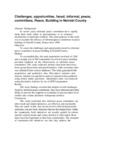Challenges and opportunities faced by informal peace committees in Peace Building in Nairobi County
Date
2020-10-10Author
Mungai, Gacaga Peter
Iteyo, Crispinous
Kassilly, Janet
Metadata
Show full item recordAbstract
In recent years, informal peace committees have rapidly made their mark either as precautionary or as response mechanisms to particular conflicts. The main purpose of this study was to examine the efficacy of informal peace committees in peace building in Nairobi County, Kenya since 1990 Objective To assess the challenges and opportunities faced by informal peace committees in peace building in Nairobi County Method To accomplish this, the study population consisted of 1260 and a sample size of 509 respondents involved in peace building provided feedback on the effectiveness of informal peace committees. The study collected primary data from interviews, focus group discussions and questionnaires, while secondary data was collected from various databases. The study generated both quantitative and qualitative data. Descriptive statistics data analysis method was applied to analyze numerical data gathered using closed ended questions. Quantitative data was analyzed using descriptive statistics by use of SPSS programme Results The study findings revealed that despite several challenges faced by informal peace committees, they have demonstrated their ability to prevent the eruption or escalation of nascent micro-level conflict into violent and more widespread conflicts Conclusion The study concluded that informal peace committees are often small and simple initiatives, yet effective and sustainable. They are small in that they do not involve official bureaucratic structures, but are local structures that are developed from within the community. Such initiatives are usually guided by culture specific cultural norms and values and that is what makes them more local but legitimate in their host communities. The strengths of community-led initiatives are that they address the community’s basic needs and challenges and can be replicated.
URI
10.29322/IJSRP.10.10.2020.p10662http://www.ijsrp.org/research-paper-1020.php?rp=P10610631
http://ir-library.mmust.ac.ke:8080/xmlui/handle/123456789/1829
Collections
- Gold Collection [1026]

